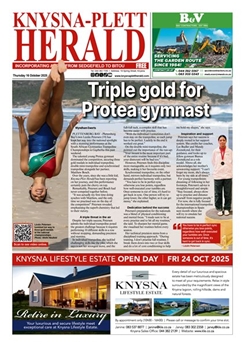KNYSNA NEWS - Foals ripped apart by dogs or being born with deformities as a result of mares being raced while on the brink of giving birth, and horses damaging property and endangering motorists are just a few issues that have come to light around the horses of Kranshoek in Plettenberg Bay.
And this is not a new problem. Residents in the surrounding areas of Kranshoek claim they have been complaining about the free-roaming horses for many years without resolve.
One of the primary problems is that there are several families in Kranshoek who own horses but do not have the facilities to care for the animals or keep them in camps. These animals end up roaming the surrounding areas in search of grazing and leave chaos in their wake.
'Breaking fences, destroying crops'
According to Lee Naude-Plociennik from the African Hoofprint Foundation, some of the issues that have arisen include that the horses damage homeowners' properties.
Farmers have reported that the stray animals break through their fences and destroy their crops, resulting in thousands of rands' damages and losses.
She added that the horses also pose a danger to motorists as the horses are often found along main roads in the surrounding areas. Jenny Cope from Bitou Horse Welfare said there have also been cases where foals made it onto properties, were met by the homeowner's dogs and in some cases were ripped apart and killed by the dogs.
'Illegal racing and injuring horses'
Naude-Plociennik said that often these horses also fall into the wrong hands. "We have had incidents where youngsters, mostly under the influence of drugs, steal the horses and then participate in illegal horse racing."
She added that these youngsters race the horses to exhaustion, often causing injury. "They are often found with wounds all over them, especially around the mouth area as they use wires as homemade bridles. They are also often found with injured hooves."
Cope said they have had two cases where foals were born with deformities as a result of mares being ridden to exhaustion while pregnant.
At wits' end
Both Cope and Naude-Plociennik said they have tried almost every avenue available to address the issues, to no avail. They have contacted the relevant authorities, including Bitou law enforcement, but the problem persists. This they believe is due to the fact the resources are limited including confiscating the horses and transporting them to the nearest pound, which is in George.
Naude-Plociennik said the situation is a pity as the horses are part of a heritage herd that came to Kranshoek with the Griqua people in 1917 during their trek from Kokstad and can be dated back even further to the Griquas more than 300 years.
Possible solution
She added that it is also a pity as horses could have a very positive impact on the community. She has been running the Africa Hoofprint Foundation since 2017 and aims to lay the foundational "hoofprints" for developing the area's youth as professional equestrian sportsmen, entry into career opportunities and access into an industry previously perceived as elitist.
Cope believes establishing a local pound is likely the only answer to the problem. This would mean that should a horse be found roaming, it could be taken to a local pound and the owners would then need to pay a fine to have their horse released. She believes this would instil a sense of responsibility. Should the horse not be claimed, it will by law become the relevant welfare organisation's property.
"From there, attempts would be made to have the horses rehomed," Cope said.
She added that the local community had already raised R11 000 for this purpose, but that they are still trying to secure a property for the pound.
'We bring you the latest Knysna, Garden Route news'
















